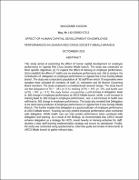Effect of human capital development on employee Performance in Uganda Red Cross society Mbale branch
Abstract
This study aimed at examining the effect of human capital development on employee performance in Uganda Red Cross Society Mbale branch. The study was conducted on three specific objectives; (i) To explore the effect of training on employee performance, (ii) to establish the effect of health care on employee performance and (iii) to analyze the contribution of delegation on employee performance in Uganda Red Cross Society Mbale branch. The study was conducted a population of 95 staff from which 76 respondents were sampled these included 49 members of staff, 21 volunteers and 06 Branch Governing Board members. The study employed a correlationional research design. The study found out that delegation (r(70) = .883, p≤ 0.5), training (r(70) = .893, p≤ .05), and health care (r(70) = .905, p ≤ 0.5). The study further revealed that, a unit increase in delegation leads to .883 change in employee performance at URCS Mbale branch, while a unit increase in training leads to .893 change in employee performance, and a unit increase in health care will lead to .905 change in employee performance. The study also revealed that Delegation is the stand alone predictor of employee performance in Uganda Red Cross Society Mbale Branch. This further implies that delegation is a good predicator of employee performance at URCS Mbale branch. Training can only predict employee performance when combined with delegation .While health care can only predict performance when combined with delegation and training. As a result of the findings, its recommended that, URCS should enhance delegation as a strategy for HCD, invest heavily in training activities for staff, develop a clear staff training implementation strategy and ensure its operational. Finally, the study was conducted using questionnaires, interview guide and review of documents at URCS Mbale branch to gather relevant data.
Collections
- Thesis and Dissertations [126]

